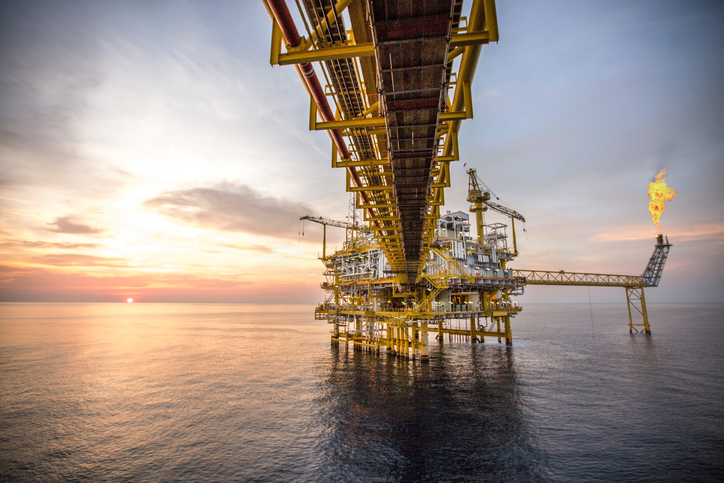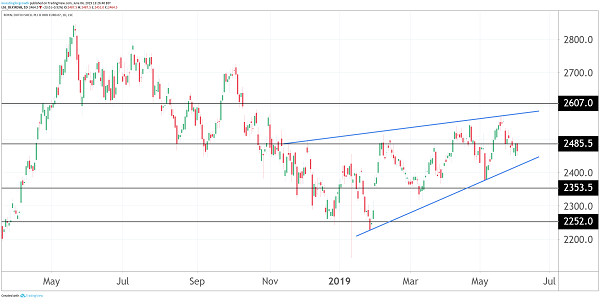Royal Dutch Shell promises shareholders $125bn windfall
Shell will further embellish its income credentials if management delivers on this impressive pledge.
4th June 2019 13:48
by Graeme Evans from interactive investor
Shell will further embellish its income credentials if management delivers on this impressive pledge.

Three years after pulling out all the stops to protect an unblemished post-war record of never cutting its dividend, Royal Dutch Shell (LSE:RDSB) looks poised to start growing the pay-out again as part of potential shareholder riches put on show by the oil major today.
The dividend has been at 47 cents a share since the start of 2014, with Shell forced to borrow in order to safeguard the payment during the three-year oil price downturn up until 2016.
The oil and gas sector is now in a very different place, with the bumper cash flows stemming from higher energy prices and a restructured portfolio of assets enabling Shell to turn on the taps for share buy-backs.
This ongoing $25 billion programme is due to run until the end of next year, towards the end of which Shell thinks it should have better visibility on increasing the shareholder dividend.
Looking further ahead to the period 2021 to 2025, today's strategy update presentation was also told about the potential to make total distributions of $125 billion or more in the form of dividends and share buy-backs.
This compares with the $90 billion expected for the current five-year period to 2020 and $52 billion in shareholder distributions in the period 2011 to 2015.

Source: TradingView Past performance is not a guide to future performance
The latest forecasts are based on cash flows reaching $35 billion for 2025 at $60 US dollars a barrel, compared with between $28 billion and $33 billion for the current five-year period.
Shell is the UK's largest dividend payer and among the top three in the world. According to Link Asset Services, oil companies represented almost a quarter of the UK total dividend payments in the first quarter of 2019.
The shares, which currently offer a yield of just below 6%, were down less than 1% at 2,468p following today's presentation by CEO Ben van Beurden.
He reiterated his confidence in Shell becoming a "world-class investment case" based around its high-margin portfolio, improving returns and a globally recognised brand.
Analysts have previously argued that Shell's ability to reward shareholders in times of lower commodity prices and across multiple years will be the true test of world-class status.
An important benchmark for achieving this was set at the end of last year when near-record quarterly cash flows of almost $15 billion easily covered its cash dividend, interest payments, share buybacks and helped to further pay down debt.
RBC Capital Markets reiterated its price target of 2,750p a share in the wake of today's update, while Deutsche Bank upped its recommendation to 2,700p earlier this month.
- Have Shell shares just issued a warning sign?
- Royal Dutch Shell: A world-class investment case?
- Income hunters can find great funds on ii’s Super 60 recommended list of investments
Shares continue to show some reluctance to approach these targets, with the uncertain outlook for oil prices one factor in the company's narrow trading range so far this year.
As well as the shareholder returns, van Beurden also pledged to increase spending over the next decade to as much as $32 billion a year. This compares with $25 billion in 2018.
Since 2016, Shell has completed more than $30 billion of divestments to reduce borrowings from the BG acquisition, which is now part of its Integrated Gas division. The group has also stepped up investment in projects offering improved cash generation.
Recent quarterly results comfortably beat expectations, with the energy giant producing double-digit beats across all operating segments. The integrated gas division delivered earnings 24% above consensus amid LNG price strength.
These articles are provided for information purposes only. Occasionally, an opinion about whether to buy or sell a specific investment may be provided by third parties. The content is not intended to be a personal recommendation to buy or sell any financial instrument or product, or to adopt any investment strategy as it is not provided based on an assessment of your investing knowledge and experience, your financial situation or your investment objectives. The value of your investments, and the income derived from them, may go down as well as up. You may not get back all the money that you invest. The investments referred to in this article may not be suitable for all investors, and if in doubt, an investor should seek advice from a qualified investment adviser.
Full performance can be found on the company or index summary page on the interactive investor website. Simply click on the company's or index name highlighted in the article.